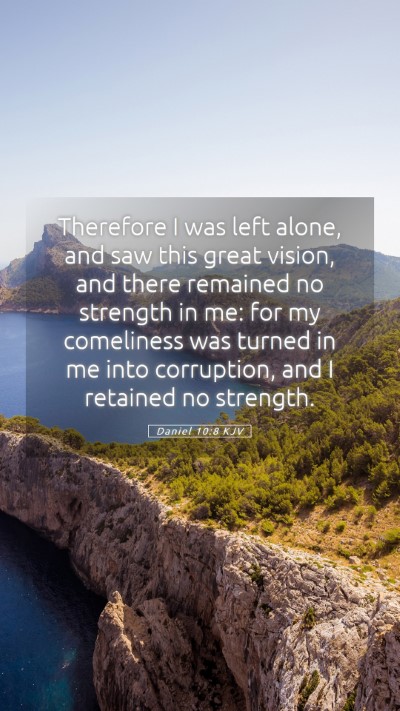Old Testament
Genesis Exodus Leviticus Numbers Deuteronomy Joshua Judges Ruth 1 Samuel 2 Samuel 1 Kings 2 Kings 1 Chronicles 2 Chronicles Ezra Nehemiah Esther Job Psalms Proverbs Ecclesiastes Song of Solomon Isaiah Jeremiah Lamentations Ezekiel Daniel Hosea Joel Amos Obadiah Jonah Micah Nahum Habakkuk Zephaniah Haggai Zechariah MalachiDaniel 10:8 Meaning
What is the meaning of Daniel 10:8?
Therefore I was left alone, and saw this great vision, and there remained no strength in me: for my comeliness was turned in me into corruption, and I retained no strength.
Daniel 10:8 Bible Verse Meaning
Understanding Daniel 10:8
This analysis focuses on Daniel 10:8 which states:
"Therefore I was left alone, and saw this great vision, and there remained no strength in me: for my comeliness was turned in me into corruption, and I retained no strength."
Overview of Scripture Context
The Book of Daniel is a rich tapestry of prophecy, historical narrative, and apocalyptic literature. Written to provide hope and insights during Israel's exile, Daniel's visions and experiences depict the sovereignty of God over earthly kingdoms.
Verse Breakdown and Commentary
In this verse, Daniel describes a profound personal experience that occurs after receiving a heavenly vision. His reaction is marked by a sense of overwhelming fear and weakness, a common response to divine encounters.
Key Themes and Insights
- Isolation in Divine Revelation:
Daniel expresses a profound sense of solitude when confronted with the divine. This emphasizes the personal nature of God's revelations and the weight of prophetic insight.
- Physical and Spiritual Weakness:
Like many prophets before him, Daniel's physical strength falters in the presence of divine majesty. This illustrates a theme seen in scripture: human frailty in the face of divine revelation (Isaiah 6:5).
- Transformation through Vision:
The vision results in a transformation where Daniel recognizes his own corruption—a stark contrast to the holiness of God. This serves as a reminder of the need for humility in the presence of divine authority.
Commentary Insights
Drawing from various public domain commentaries:
- Matthew Henry: He notes that the experience led Daniel to a state of despair, indicating that the visions he received came with an inherent weight that affected his physical, emotional, and spiritual state.
- Adam Clarke: He elaborates on the emotional turmoil Daniel underwent, reflecting on the idea that prophetic visions were often accompanied by fear and frailty, pointing out the necessary preparation of the heart and mind before engaging with the heavenly.
- Albert Barnes: Barnes emphasizes the significance of the vision as not solely informational but transformative. The quaking of Daniel's composure signifies a deeper divine communication that challenges human understanding and existence.
Application to Modern Life
The implications of Daniel 10:8 stretch well beyond its immediate context and bear meaning for modern-day believers.
- Humility in Prayer: Recognizing our own weaknesses can lead to a more sincere and humble approach to prayer and divine communication.
- Expectations from Divine Encounters: This verse reminds us to approach God with the awareness that His presence can elicit profound change in our lives, often requiring us to confront our own weaknesses.
- Personal Isolation with God: The solitary experience of Daniel calls believers to seek moments of solitude where they can be vulnerable before God, inviting revelation and personal transformation.
Cross References
Daniel 10:8 connects with several other scriptural passages, including:
- Isaiah 6:5 - The vision of the throne of God resulting in Isaiah's acknowledgment of his own unworthiness.
- Ezekiel 1:28 - Ezekiel’s overwhelming encounter with the glory of the Lord, leading to physical and emotional responses.
- Revelation 1:17 - John’s reaction to the glorified Christ—falling at His feet as dead, echoing Daniel’s overwhelmed state.
Conclusion: The Insights of Daniel 10:8
Daniel 10:8 encapsulates the essence of divine revelation and the human spirit. As we engage in Bible study insights related to this verse, we uncover layers of meaning that speak to the heart of understanding Scripture. Aligning this verse with personal application illuminates the ongoing journey of faith—inviting us to confront our frailties while seeking the transformative power of God's presence.


